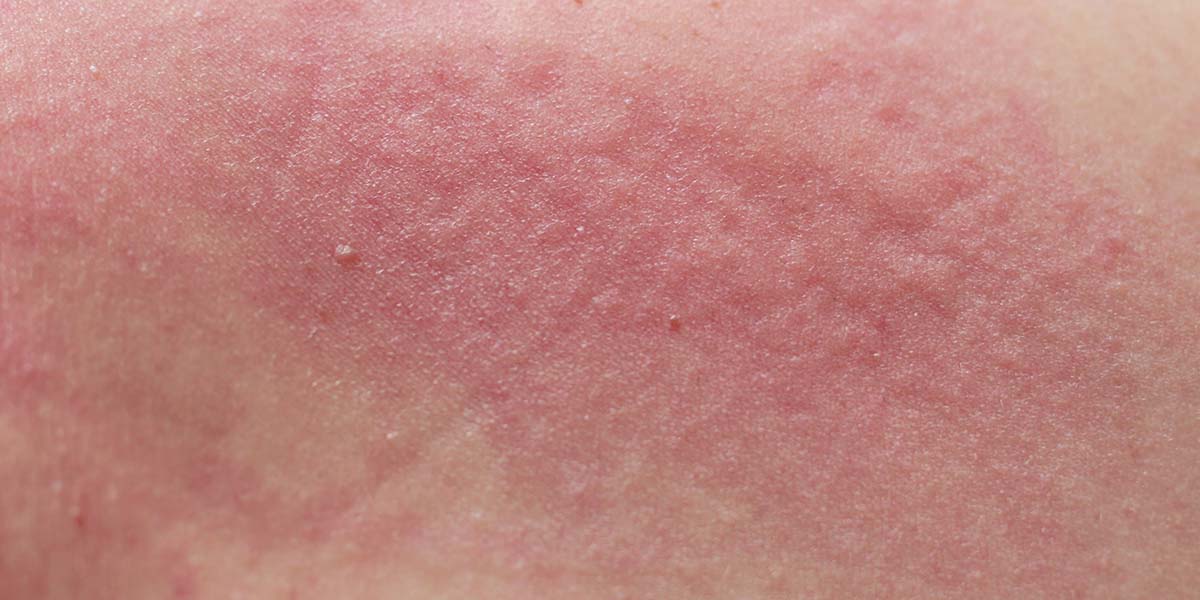If you suffer from symptoms such as redness, blotchiness or tingling on your face, you may be one of 50% of the population that believes you have sensitive skin, but this may not be the case!
These symptoms could be attributed to either sensitive skin or sensitized skin – they sound the same but there is a difference and therefore the conditions may need to be managed slightly differently.

Sensitized or Sensitive Skin?
Sensitized Skin
This condition is not a skin type that you are born with, rather it is caused or triggered by external and internal factors. Sensitized skin tends to look dry, irritated, red and blotchy.
Typical factors that trigger sensitized skin include:
- External factors: stress, pollution, smoke, too much sun, harsh weather conditions
- Internal factors: change of medication, poor diet, inadequate water intake, certain topical treatments
Enough of these irritants can damage your skin’s protective lipid barrier, which makes it very challenging for your skin to defend itself against aggressors. The positive thing is because this not a skin type, you can work through a plan to help bring your skin back to optimal health.
If your skin microbiome is compromised, you may like to strip back your skincare routine and wash with water only.
Sensitive Skin
If you have sensitive skin, it is caused by a genetic predisposition and you may find there are other sufferers in your family. The root cause is the protective outer layer of your skin (the epidermal lipid barrier) is unable or less effective at blocking allergens and irritants.
There are a huge number of allergens and irritants that cause sensitive skin to flare up. They can be found in everyday items such as laundry detergents, shampoos, soaps, clothing fabrics, metals, certain foods, medication and certain plants, so it is hard to completely avoid them.
People with this genetic predisposition are prone to inflammatory skin conditions including:
- Dermatitis. This is a common condition and can occur in a number of forms including eczema and contact dermatitis. Symptoms are itchy dry skin, rash or swollen, reddened skin. The sufferer may experience skin that blisters, oozes, crusts or flakes off.
- Eczema (atopic dermatitis) causes redness, itching, and sometimes infections. The skin does not retain moisture very well, making it prone to allergens and irritants. When the skin gets irritated, it can trigger a release of chemicals that make it itchy.
- Perioral dermatitis is an inflammatory rash occurring around the mouth, nose, chin and eyes. It is common in women and can be a result of using topical steroid medication.
Whilst sensitive skin is not something you can cure, it can certainly be helped with a holistic skincare regime and consulting with professionals as needed. Kiri, found of AMPERNA® can certainly help you with a holistic approach to your skin health, you can contact Kiri or sign up for skin coaching.

How to Help Sensitized & Sensitive Skin
Whether you have sensitive or sensitized skin, it’s critical to use products that help with skin inflammation that also help protect your skin’s outer barrier.
As a start it is a good idea to establish a skin care routine that you can follow every day.
Good skin care starts with:
- A good cleansing & moisturising routine
- Treating the skin with suitable "active" products if required (be sure to conduct patch tests first)
- Protecting your skin from the sun
When trialing new products, it is a good idea to start with the essentials such as a cleanser and moisturiser designed for all skin types. Once you establish the basic products are working, you can introduce additional products. This will help you identify any ingredients that exacerbate your sensitivity or might trigger flare-ups.
The AMPERNA® range works to help re-balance and transform the appearance of even the most sensitive skin by protecting the skin’s surface whilst delivering active ingredient to the lower epidermis. The hero ingredient in the AMPERNA® range is the active probiotic complex, Lactococcus ferment lysate. This probiotic complex helps to support the skin barrier; helping to protect you from aggressions such as environmental pollutants, helps keep your immune system in check and helps reduce inflammation.
As previously mentioned, sensitized skin is caused by some things that you can control such as diet, stress, water intake and others that are harder to avoid such as harsh weather and pollution.
In addition to your skin care routine, good habits that support healthy skin for sufferers of both conditions are:
- Eating a balanced diet and limit alcohol consumption
- Regular exercise
- Plenty of rest and seven to eight hours of sleep each night.
- Mindfulness techniques such as breathing, yoga and meditation
- Drinking plenty of water
- Being mindful about topical treatments you are using such as steroids
Reference sources:
https://www.health.com/skin-conditions


















